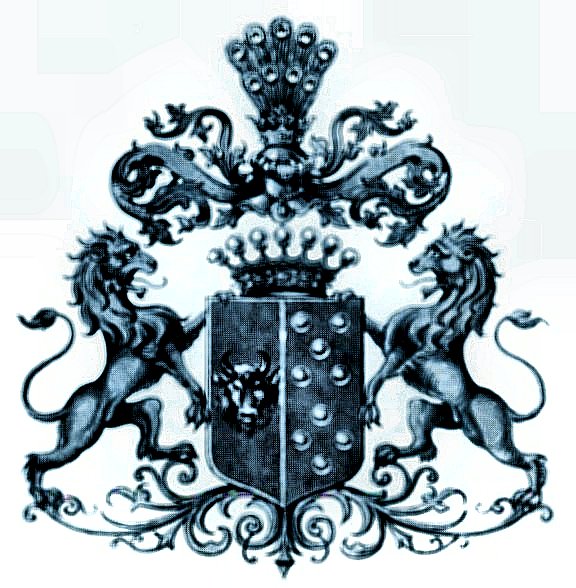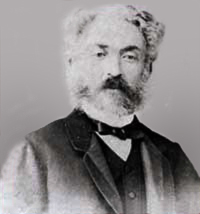|
Hurmuzachi
Hurmuzachi (Hurmuzaki, Hurmuzache) is a noble Romanian family from Bukovina of Greek origin. During the 17th-19th centuries they were associated with the Cernăuca estate in Bukovina. History The most prominent members were the Hurmuzachi brothers. Their father was Doxaki (Doxachi, Doxache, Doxaki) Hurmuzaki (d. April 1857), who eventually re-acquired Cernăuca after the documents of the ownership of the estate by the family had been lost and built a new ''boier'' palace and church and planted park there. Doxaki married Iuliana (Ilinka, Olena) Murguleț (d.1858), daughter of a Romanian ''boier'' ('' stolnic''), and they had 12 children, of whom 7 survived: the five brothers and two sisters, Eufrozina and Eliza. Doxaki was son of '' medelnicer'' Constantin Hurmuzachi and Roksana (d. August 12, 1818) from Moldavia. Notable members * Constantin (1811–1869) * Eudoxiu (1812–1878) *Gheorghe (1817–1882) *Alexandru (1823–1871) * Nicolae (1826–1909) Image:Constantin Hurmu ... [...More Info...] [...Related Items...] OR: [Wikipedia] [Google] [Baidu] |
Hurmuzachi Brothers
The Hurmuzachi brothers, Alexandru (1823-1871), Constantin (1811-1869), Eudoxiu (1812-1874), Gheorghe (1817-1882), and Nicolae (1826-1909), were members of an old Hurmuzachi family of Romanian nobles in Austrian BukovinaChastain with an estate in Cernăuca. They were activists in the Romanian national movement in Bukovina and elsewhere. Their estate was a center of activity for Romanians during the Revolutions of 1848, and they were later a key source of material and financial support to nationalist exiles, as well as a point of contact through whom the ideas of the exiles reentered the country. Their father was Doxachi (Doxache, Doxaki) Hurmuzachi (Hurmuzaki).Preotesoiu Eudoxiu and Alexandru Hurmuzachi were members of the Romanian Academy The Romanian Academy ( ro, Academia Română ) is a cultural forum founded in Bucharest, Romania, in 1866. It covers the scientific, artistic and literary domains. The academy has 181 active members who are elected for life. According t ... [...More Info...] [...Related Items...] OR: [Wikipedia] [Google] [Baidu] |
Hurmuzachi Psalter
Hurmuzachi (Hurmuzaki, Hurmuzache) is a noble Romanian family from Bukovina of Greek origin. During the 17th-19th centuries they were associated with the Cernăuca estate in Bukovina. History The most prominent members were the Hurmuzachi brothers. Their father was Doxaki (Doxachi, Doxache, Doxaki) Hurmuzaki (d. April 1857), who eventually re-acquired Cernăuca after the documents of the ownership of the estate by the family had been lost and built a new ''boier'' palace and church and planted park there. Doxaki married Iuliana (Ilinka, Olena) Murguleț (d.1858), daughter of a Romanian ''boier'' (''stolnic''), and they had 12 children, of whom 7 survived: the five brothers and two sisters, Eufrozina and Eliza. Doxaki was son of '' medelnicer'' Constantin Hurmuzachi and Roksana (d. August 12, 1818) from Moldavia. Notable members *Constantin (1811–1869) * Eudoxiu (1812–1878) *Gheorghe (1817–1882) *Alexandru (1823–1871) * Nicolae (1826–1909) Image:Constantin Hurmuzach ... [...More Info...] [...Related Items...] OR: [Wikipedia] [Google] [Baidu] |
Eudoxiu Hurmuzachi
Eudoxiu Hurmuzachi (also spelled Eudoxiu Hurmuzache; german: link=no, Eudoxius Freiherr von Hormuzaki) (September 29, 1812, Czernawka, Austria; February 10, 1874, Czernowitz, Austria, buried in Dulcești, Romania) was a Romanian historian, politician ( Landeshauptmann of the Duchy of Bucovina) and patriot. Origins Hurmuzachi was born into a family of old noble lineage (see Hurmuzachi brothers), as the second son of Doxache Hurmuzachi, at the family estate in Cernăuca, Austria (now Chornivka, Ukraine), located in the historic region of Bukovina. His father used to offer refuge to persecuted Romanian political leaders from Transylvania, and went into considerable debt for this. Together with his brothers, Eudoxiu would become one of the leading figures of the Romanian national movement in Bukovina. Activity Hurmuzachi went to Vienna to study history; there he experienced the events of 1848, and decided to interrupt his studies. He returned home and participated in the mo ... [...More Info...] [...Related Items...] OR: [Wikipedia] [Google] [Baidu] |
Chornivka
Chornivka ( uk, Чорнівка, ro, Cernăuca, german: Czernowka) is a village in Chernivtsi Raion, Chernivtsi Oblast (province) of western Ukraine. It belongs to Chernivtsi urban hromada, one of the hromadas of Ukraine. It is located in the historic region of Bukovina ( uk, Буковина), approximately 22 km from the oblast capital, Chernivtsi. The current estimated population is 2,340 (as of 2005). As of 2005, the mayor was Gheorghe Bota. History Chornivka is home to the ancestral estate of the Hurmuzachi brothers, a well-known family of Romanian aristocrats, lawyers and historians from the 19th century. The mansion was transformed into a museum in October 1999. In the 17th century, the estate had been in the possession of the family of Ion Neculce, a Moldavian chronicler. It had come into the family's possession by marriage, as a wedding gift to Neculce's mother. It was then passed on to one of Neculce's sisters. The oldest church, built by the Hurmuzachi f ... [...More Info...] [...Related Items...] OR: [Wikipedia] [Google] [Baidu] |
Alexandru Hurmuzachi
Alexandru (Alecu) Hurmuzaki (16 August 1823 in Cernauca - 8 March /20 March 1871 in Naples) was a Romanian politician and publisher. He was one of the founding members of the Romanian Academy The Romanian Academy ( ro, Academia Română ) is a cultural forum founded in Bucharest, Romania, in 1866. It covers the scientific, artistic and literary domains. The academy has 181 active members who are elected for life. According to its byl .... See also * Hurmuzachi family 1823 births 1871 deaths Romanian publishers (people) Ethnic Romanian politicians in Bukovina {{Romania-politician-stub ... [...More Info...] [...Related Items...] OR: [Wikipedia] [Google] [Baidu] |
Wappen Der Freiherren Nikolaus Und Georg Von Hormuzaki Von 1881
A coat of arms is a heraldic visual design on an escutcheon (i.e., shield), surcoat, or tabard (the latter two being outer garments). The coat of arms on an escutcheon forms the central element of the full heraldic achievement, which in its whole consists of a shield, supporters, a crest, and a motto. A coat of arms is traditionally unique to an individual person, family, state, organization, school or corporation. The term itself of 'coat of arms' describing in modern times just the heraldic design, originates from the description of the entire medieval chainmail 'surcoat' garment used in combat or preparation for the latter. Rolls of arms are collections of many coats of arms, and since the early Modern Age centuries, they have been a source of information for public showing and tracing the membership of a noble family, and therefore its genealogy across time. History Heraldic designs came into general use among European nobility in the 12th century. Systematic, herit ... [...More Info...] [...Related Items...] OR: [Wikipedia] [Google] [Baidu] |
Academician
An academician is a full member of an artistic, literary, engineering, or scientific academy. In many countries, it is an honorific title used to denote a full member of an academy that has a strong influence on national scientific life. In systems such as the Academy of Sciences of the USSR, the title grants privileges and administrative responsibilities for funding allocation and research priorities. History Historically, the meaning for the title of ''Academician'' follows the traditions of the two most successful early scientific societies: either the Royal Society, where it was an honorary recognition by an independent body of peer reviewers and was meant to distinguish a person, while giving relatively little formal power, or the model of the French Academy of Sciences, which was much closer integrated with the government, provided with more state funding as an organization, and where the title of ''Academician'' implied in a lot more rights when it came to decision maki ... [...More Info...] [...Related Items...] OR: [Wikipedia] [Google] [Baidu] |
Anatol Hurmuzaki
Anatol is a masculine given name, derived from the Greek name Ἀνατόλιος ''Anatolius'', meaning "sunrise". The Russian version of the name is Anatoly (also transliterated as Anatoliy and Anatoli). The French version is Anatole. A rarer variant is Anatolio. Saint Anatolius of Laodicea was a third-century saint from Alexandria in Egypt. in ''Behind the Name''. was also the name of the first . People Notable people with the name include: * |
Romanian Language
Romanian (obsolete spellings: Rumanian or Roumanian; autonym: ''limba română'' , or ''românește'', ) is the official and main language of Romania and the Moldova, Republic of Moldova. As a minority language it is spoken by stable communities in the countries surrounding Romania (Romanians in Bulgaria, Bulgaria, Romanians in Hungary, Hungary, Romanians of Serbia, Serbia, and Romanians in Ukraine, Ukraine), and by the large Romanian diaspora. In total, it is spoken by 28–29 million people as an First language, L1+Second language, L2, of whom 23–24 millions are native speakers. In Europe, Romanian is rated as a medium level language, occupying the tenth position among thirty-seven Official language, official languages. Romanian is part of the Eastern Romance languages, Eastern Romance sub-branch of Romance languages, a linguistic group that evolved from several dialects of Vulgar Latin which separated from the Italo-Western languages, Western Romance languages in the co ... [...More Info...] [...Related Items...] OR: [Wikipedia] [Google] [Baidu] |
Nicolae Hurmuzaki
{{disambig ...
Nicolae may refer to: * Nicolae (name), a Romanian name * ''Nicolae'' (novel), a 1997 novel See also *Nicolai (other) *Nicolao Nicolao is an Italian given name and a surname. It may refer to the following: Given name *Nicolao Civitali (1482 - after 1560), Italian sculptor and architect *Nicolao Colletti (18th century), Italian mathematician *Nicolao Dorati (c. 1513 – 159 ... [...More Info...] [...Related Items...] OR: [Wikipedia] [Google] [Baidu] |
Gheorghe Hurmuzachi
Gheorghe is a Romanian given name and surname. It is a variant of George, also a name in Romanian but with soft Gs. It may refer to: Given name * Gheorghe Adamescu * Gheorghe Albu * Gheorghe Alexandrescu * Gheorghe Andriev * Gheorghe Apostol * Gheorghe Apostoleanu * Gheorghe Argeşanu * Gheorghe Arsenescu * Gheorghe Asachi * Gheorghe Băgulescu * Gheorghe Balș * Gheorghe Bănciulescu * Gheorghe Banu * Gheorghe Barbu * Gheorghe Benga * Gheorghe Bengescu * Gheorghe Bibescu * Gheorghe Bogdan-Duică * Gheorghe Brăescu * Gheorghe Brega * Gheorghe Briceag * Gheorghe Bucur * Gheorghe Buruiană * Gheorghe Buzatu * Gheorghe Buzdugan * Gheorghe Calciu-Dumitreasa * Gheorghe Călugăreanu * Gheorghe Caranda * Gheorghe Cardaș * Gheorghe Grigore Cantacuzino * Gheorghe Cartianu-Popescu * Gheorghe Catrina * Gheorghe Cialâk * Gheorghe Cipăianu * Gheorghe E. Cojocaru * Gheorghe Cosma * Gheorghe Danielov * Gheorghe Dănilă * Gheorghe Derussi * Gheorghe Dinică * Gheorghe Duca * Gheo ... [...More Info...] [...Related Items...] OR: [Wikipedia] [Google] [Baidu] |
Moldavia
Moldavia ( ro, Moldova, or , literally "The Country of Moldavia"; in Romanian Cyrillic: or ; chu, Землѧ Молдавскаѧ; el, Ἡγεμονία τῆς Μολδαβίας) is a historical region and former principality in Central and Eastern Europe, corresponding to the territory between the Eastern Carpathians and the Dniester River. An initially independent and later autonomous state, it existed from the 14th century to 1859, when it united with Wallachia () as the basis of the modern Romanian state; at various times, Moldavia included the regions of Bessarabia (with the Budjak), all of Bukovina and Hertsa. The region of Pokuttya was also part of it for a period of time. The western half of Moldavia is now part of Romania, the eastern side belongs to the Republic of Moldova, and the northern and southeastern parts are territories of Ukraine. Name and etymology The original and short-lived reference to the region was ''Bogdania'', after Bogdan I, the fo ... [...More Info...] [...Related Items...] OR: [Wikipedia] [Google] [Baidu] |




